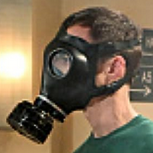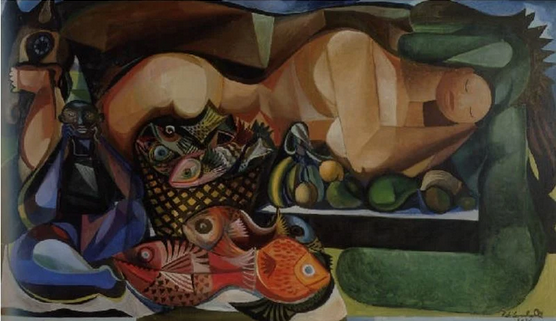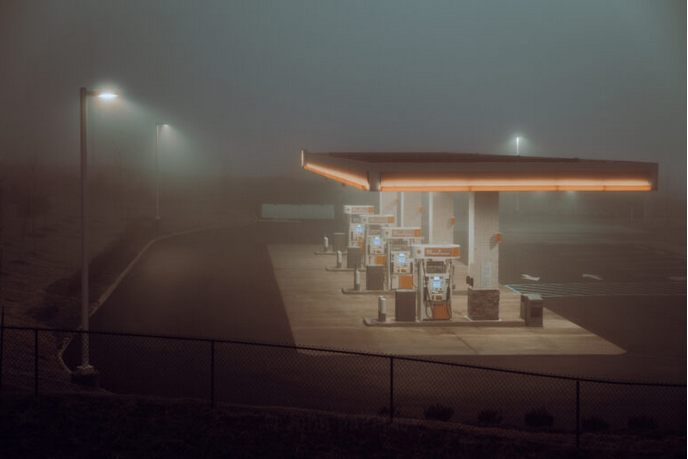-
Posts
2,146 -
Joined
-
Last visited
Content Type
Profiles
Events
Forums
Store
Everything posted by howard
-
Yes it's good to get out a lot with this weather. I walked along the river this morning, the warmth, trees budding, birds singing, etc, etc. As long as I can keep my mind active I feel okay, but I suppose we all have highs and lows. The reason I was thinking of a still life, although you've already done them, is I think we all start by copying 2D images. So it's good to get something like a tea pot or vase, grab hold of it and look at every angle, and then try a more 3D exercise. I am doing one at the moment, it's a bit of a challenge trying to get everything looking right, also like in your painting above, I start to notice shadows and different nuanced effects.(still like the splashes).
-

Ashwagandha supplement
howard replied to wanttogetbetter1's topic in Obsessive-Compulsive Disorder (OCD)
Someone else asked about this a few weeks ago. They didn't get any feedback either so I'm assuming no one has tried it. The thing is it's like any medicine, it's a matter of trial and error with a specific person. So after consulting an expert you could try a small dose and see if it reduces your anxiety. It's really up to you, but I would consult with an expert on natural medicines. -
Interesting character Flavio de Cavalho, studied in UK and you can tell how successful his rebellious acts were because he was arrested a few times until recognised as a radical thinker. I think a good portrait painter can do that, catch different aspects of a person over time while they sit. He looks a bit cold with that stare(maybe bored). I think it's obvious which countries are more vibrant culturally as they usually have a younger population, but Flavio was protesting against a dominant Catholic church and the legacy of colonialisation, so it's like a young nation trying to free itself from the past and like many countries the politics oscillates between the two. I know that Brazilian mural artists are renowned and they also use folk and tribal imagery and the vibrant colour palette. Eduardo Kobra>
-
I do think Brazil is a fascinating country with it's diverse countryside to it's traditions some from Africa. I've seen a few films like City of Men and watched Fitzcarraldo again the other day, and have heard plenty of their music, but I don't think I've read any books or seen any art. I like the ones that reference their folk art and you can see which ones in the exhibition were influenced by European movements. Here's one by Emiliano di Cavalcanti 'Mulher deitada com peixes e frutas' (1956) > fecundity and symbolism.
-

How do you let things go.....
howard replied to Garfield's topic in Obsessive-Compulsive Disorder (OCD)
I think how you respond to a perceived slight depends on a number of factors. Like family dynamics(when young), personality, who the person is and what they said, also we live in a society which dictates that we should keep our emotions in check and conform and be polite. So let's say someone says something to you which you don't agree with and it makes you angry, if you respond straight away, deny what they say and express that their comment has angered you. It's dealt with. If you don't respond the comment goes into your mind, and if you have ocd it's hard to let it go. Also rather than express the anger cleanly, we repress it, it builds and also becomes hard to let go of. That might suit society but it's unhealthy for the person. So yes just accepting that anger is a 'normal' reaction in certain circumstances and that it's better to express it cleanly than repress it is a good way of seeing it. -
Stunning chettah, just doing something like that makes you really appreciate the animal and the camouflage(you were busy there). Yes those Freudian ideas are dated but sort of foundations. I've had that sculpture of hers above in my mind and I think it's a powerful piece with that title. You're fortunate to live in a cultural capital. I think the still life is a student exercise, maybe to help you get a feel for 3D objects in space and from there drawing from real life. Maybe sometime I have been trying one myself, just done a drawing and have been looking at examples online from students to Braque. I just want to use charcoal and chalk. Enjoy focusing.
-

How do you let things go.....
howard replied to Garfield's topic in Obsessive-Compulsive Disorder (OCD)
Anger is one of the difficult emotions to let go of as well as what made you feel that way. I think that by examining what was said, by whom, how we interpreted it, etc we can process the thoughts and adapt our minds to understand. So we may feel more in control if a similar situation happens again. I think it's possible to reduce the anger in stages. When you remember a slight then just sit with the anger and feel it for a while. Even if you can just diminish it to a level that doesn't affect you too much. But also by experiencing the emotions we expand our range of how to process our emotions at the time they happen. -

How do you let things go.....
howard replied to Garfield's topic in Obsessive-Compulsive Disorder (OCD)
With regard to your first sentence, I think all people do that to a greater or lesser degree depending on circumstances. Of course ocd will exaggerate and complicate the process of letting go of a perceived slight. All people process the thoughts and recollections and any possible emotions associated with them as a way of letting things go. So for example with a possible 'slight'. Who said it, did it have any validity or not, or was it down to over sensitivity to criticism. There will be different emotions associated with each stage. I think it's probable that specific thoughts/memories evoke certain emotions or feelings, even a combination. It all takes time to process. Sometimes the process involves really forgiving someone and letting go that way. Or you can just take the attitude of not caring what people think as long as you are happy in yourself and being true to yourself -

ROCD or just me ruining my relationship
howard replied to ScottishSunflower's topic in Obsessive-Compulsive Disorder (OCD)
I think you are worrying too much. Is there anything happening at those times when you feel insecure and loose confidence in yourself and your relationship. It sounds like your partner is used to you having times when you need a bit of support and reassurance and if anything he's probably only concerned for you. I know it's easy to overthink things and read into actions or expressions in a negative way when maybe feeling stressed, or emotionally/mentally low. I would try to focus on yourself(and know that your partner is there if you need him). Maybe you could develop some strategies. If you know at some point you might feel emotionally low think of ways you boost your confidence in yourself when that happens. Do something that will make you feel good about yourself. -
I think it's different for everyone. Another way of saying it could be that in terms of real threat they all mean nothing. I think as you are aware some of your issues are driven by commitment concerns and possibly losing your independence and moving in with your GF. So it could be you just focus on any issue you think gives you a reason to not face those fears directly. So as one fear diminishes you find another to replace it with. I do have a hierarchy of contaminants but that's based on risk factors. The risk factor changes with each specific case as I come into contact with them, but the hierarchy remains.
-
I think we've travelled the time and space of art and culture but it all interesting and entertaining even if we loop back occasionally. I also see all the links like; Marylin Monroe, Kennedy, Warhol and Bowie. Refrencing culture itself as a source. Interest in Freud's ideas have changed art through surrealism but also this idea of 'the return of the repressed', which opens up art to everyone and encourages inclusivity and diversity. Apparently Louise Bourgeois undertook psychoanalysis for 30 years and kept notes which has led to a further understanding of her work. She worked with and represented the idea of 'the return of the repressed'. The Dangerous Obsession> @bendylouiseHave you tried doing a still life based on real objects. I was just thinking you learnt how to draw and paint using the tutorials so do you feel ready for the challenge.
-
@ocdjonesy I quite like taking something basic like a smartphone and seeing what's possible. Even just attempting what photographers achieve is interesting. Also each photo I see changes the way I see. I particularly like the first two in the first post and the second in the second post. That is a good way to get that effect, from a car(assuming). @daja yes seeing that photo makes me want to go and hang out behind the petrol station, something about the colours and lights in the mist.
-
It's something I've been thinking about. I think a smartphone makes it easier and I've been thinking about where I could stand to catch photos of people when they aren't aware. Because like you say once they are aware they act differently. I wasn't sure how staged Higbee's photos are. I think sometimes he must just see something like this advert and wait for the opportunity. Here's another photographer who uses the process to cope with anxiety by distracting himself, John Bariaux. I like these modern images of everyday scenes but with their own aesthetic.
-
I think you should talk to a counsellor or specialist(colleges usually have access). The revenge porn incident must have affected you in a number of ways including trust. It also sounds like it's making you observe your actions and altering how you perceive those. With a counsellor you can discuss how this has affected you and made you feel. Take it easy on yourself.
-
I came across a few photographers that find the photographic process is therapeutic as a way of focussing their minds. 'escape a constant buzz of anxiety'(JH). Others who just wanted to document their lives and dispel some of the misconceptions about their conditions. Jonathan Higbee struggled with depression, anxiety and ocd and he created a series called 'Akathisia' after the side effects he had while coming off SSRI's. He also has a witty sense for coincidences>
-
It sounds like you need to completly calm down and stop thinking. What do you do to focus your mind or distract your mind or calm it? I think a lot of the thinking patterns that you display are natural and most people experience them. But because of ocd over thinking(and underlying perfectionism, control and order> desire to have) you are over exaggerating the risks, and the risk of anything you worry about happening. Also this thinking then leads to more anxiety and you have problems letting go of you past and future fears. If something happens, like the oil stain. Yes we may be concerned it will happen again, so we either adapt so it doesn't or after a while just forget about it. I think you need to stop thinking on the layer of symptoms and address the underlying concerns. Why do you feel this need for order and control?
-
Again you are second guessing future events, speculating from a negative perspective. And what happens when you do that, you become more anxious. The idea is to be less anxious, more relaxed and not create things to worry about. You work in shop.(full stop)
-
I do like the interplay between the texture of the threads and the Rita Heyworth image. I've often thought of buying mass produced objects and using them in a different way. I'm not sure I would have thought of using toy soldiers. It's also clever when the parts have a connection to the whole image. It's also interesting trying to work out how they did it.
-
It is weird that there's these apparent hierachies in art. I think there's an etherial subtlety to water colours as we build up transparent layers and that's another great painting by Denis Ryan. It takes a certain skill to create and see through those layers. I have been thinking about why so many people seem stuck on traditional painting and sculpture. Also thinking about the 'culture wars' nonsense which has actually been bubbling away for decades since Modern art started to confound people. I think part of it is that culture itself is a progressive wave of change. I've mentioned an idea that's prevalent, 'the return of the repressed', so all those marginalised people are now being recognised and their stories, art and culture included which is fueling that wave of change and all of our understanding of other people's lives. So if people don't engage with modern culture they essentially get stuck in the past and don't understand why the world has changed around them. Art and culture are really about opening our minds. So it's good to keep ripping up the rule book. No hierarchies, explore different subject matter and be open in the use of materials and be open to new techniques. Yes so that's an incredible portrait of Lt. Kennedy, Rita Heyworh and self portrait by Seguin. Bernard Pras>
-
I seem to remember that the Royal Society wouldn't let Turner join at first because he painted with water colours. So he started using oils more. He also painted in the back waters of Venice. But water colours I think can be superior in their subtlety. There might be some snobbery about oil painting. I hadn't seen that one, I could only find a few and with such varied style I wondered if there were many Denis Ryans. As well as the water with the sparkling reflections I also like the subtle gradients of blue to depict further and further distance. There's a game I like mainly for the sailing, and the depiction of moving water is so realistic. I go for a relaxing virtual sail tacking around San Fran harbour. Yes as soon as I saw that car I knew what the scene was. Here's another by Ryan that reminds me of that Japanese aesthetic displayed in Provoke.
-

please someone help ROCD and memory hoarding
howard replied to juliaaappp's topic in Obsessive-Compulsive Disorder (OCD)
I'm not sure how to address this, your mind is racing and it would probably help if you could calm yourself first. Firstly it's good that you have been able to move on from your past obsessions. You seem to have become obsessed with something that doesn't make sense. Yes I know that's the nature of ocd so maybe if you could change or adapt your thinking patterns it might help. Let's try to unpick it. Are you in any way feeling anxious about something that is driving this way of thinking? It's impossible to remember everything. You certainly aren't going to remember every interaction instantaneously. You may remember a specific interaction if something reminds you of it. You have to remember how much data our minds absorb and store, it would overwhelm us to be aware of all that data simultaneously. Even on a specific topic spread over hours, days , years. But that doesn't mean that they didn't happen. Also your BF is no longer the same person as he was 2 or 3 years ago and neither are you. Yes fundamentally he's the same person but both of you have aged physically and mentally, had different experiences and grown as people. Grown together. So the only version of your BF that you need to know is the one he is now. -
I do have a sort of obsession with blue cheese at present. I think I was pushing my camera to the limit with that picture and I don't have a tripod(yet) so hard to keep still at that mag. But something I'd like to explore. I hadn't thought about it at first but you're right and the colour makes it. I think as well at that mag all surfaces look visceral.
-
I did do a quick sketch of one of our kittens and used that to carve a wooden cat curled up(quite roughly cut). Soon @bendylouise you'll be able to do a large garden full of animals and life. I did by accident come across this painter. He has the same name as one of the ocd artists. Denis Ryan, the first an exquisite water colour from the back waters of Venice and the second I'm guessing based on a photograph or it's a coloured photograph.
-
It's only Penicillium at present. But I think there's a whole world to discover with macro lenses. This is from Sony's awards by Marco Colletta 'The Cave'>
-
It's an interesting phenomena, how our minds are continually interpreting what we see and trying to make sense of it. I think some people take it a bit far sometimes, seeing elvis in a potato crisp, etc. I'm not sure why I had the urge to photograph cheese at 2 am this morning.



